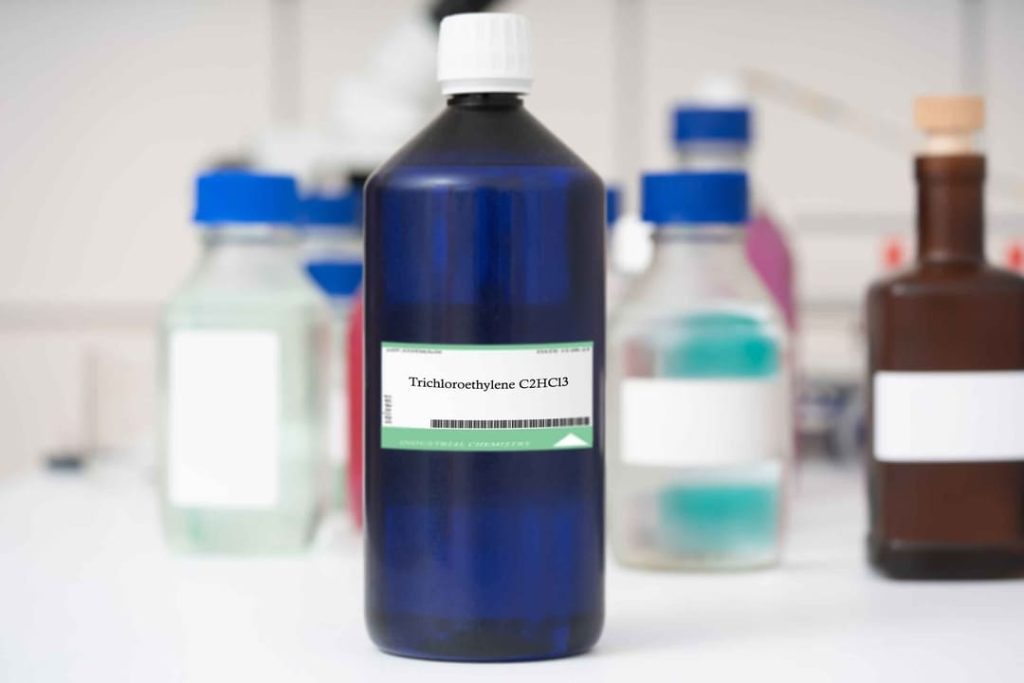Looking for Expert-Level VA Claim Answers?📱Call Us Now! 737-295-2226
Serving in the military exposes individuals to various hazards, including contact with harmful substances.
While some veterans are familiar with the health risks linked to Agent Orange, others might have encountered different chemicals like trichloroethylene (TCE) during their service.
Trichloroethylene stands as one of the hazardous chemicals that veterans might have been exposed to during service.
If you have developed health issues due to your TCE exposure, you might qualify for trichloroethylene VA disability.

What Is Trichloroethylene?
Trichloroethylene (TCE) is a colorless and nonflammable halocarbon substance used in some household products, such as cleaning wipes, aerosol cleaning products, tool cleaners, paint removers, spray adhesives, carpet cleaners, and spot removers.
It served as a cleaning solvent in the US Armed Forces, predominantly utilized for the maintenance and degreasing of machinery and equipment.
Health Effects
Trichloroethylene is a known carcinogen. Studies show that exposure to trichloroethylene can lead to serious health consequences and long-term conditions—including cancer.
Unfortunately, this seemingly useful solvent proved toxic, leading to detrimental health effects among numerous veterans.

Trichloroethylene Military Exposure
Many veterans may have been exposed to trichloroethylene in the short term or chronically. Service members have historically been exposed to TCE through their daily tasks or through living on military bases.
TCE was used by the military extensively, eventually making its way into the soil and groundwater of certain military bases.
Various military personnel in certain positions may have had a greater likelihood of trichloroethylene exposure, including:
- Computer specialists
- Radar technicians
- System technicians
- Corrosive control technicians
- Jet engine mechanics
- Weapon specialists
- Communications equipment repairman
- Missile technicians
- Aircraft structural mechanics
- Avionics technicians
Veterans who have developed a VA-rateable health condition could qualify for trichloroethylene VA disability benefits.

Trichloroethylene Exposure VA Disability Benefits
The VA extends disability benefits to veterans upon substantiating a condition linked to their exposure to trichloroethylene (TCE) or probable exposure to this chemical.
This coverage encompasses veterans, reservists, and guardsmen who developed conditions during active service, offering potential eligibility for tax-free monthly payments alongside medical care.
Determining your eligibility involves meeting specific criteria:
- Confirmation of a diagnosed illness or health condition attributed to or exacerbated by exposure to a specific toxin in air, soil, or water.
- Service on active duty in a location where exposure to a toxic hazard, like trichloroethylene at Camp Lejeune, was more than likely.
- Absence of a dishonorable discharge, as this status renders veterans ineligible for various VA benefits.
- A nexus linking the currently diagnosed condition to an in-service event, illness, or aggravation via competent medical evidence
However, veterans may claim exposure to specific toxins based on the occupational duties they performed during their military service.
The VA may not recognize specific disabilities as presumptively due to the claimed occupational exposure; therefore, each exposure event should be considered based on the places, types, and circumstances of the veteran’s service, consistent with 38 CFR 3.303(a).

Trichloroethylene VA Disability
The VA extends disability benefits to veterans, reservists, and guardsmen impacted by conditions acquired during active duty, including those linked to TCE exposure.
Active, service-connected cancer qualifies for a 100% VA rating. This 100% VA rating continues for six months following the completion of your treatment. Following successful cancer treatment, the VA will rate you based on any residual symptoms you may have.
Trichloroethylene Compensation
Trichloroethylene compensation is based on VA rating for your VA-rateable condition—such as cancer. Trichloroethylene compensation ranges from $171.23 to $3,737.85 (rate based on veteran alone) based on your VA disability rating.
Trichloroethylene Presumptive Conditions
Similar to Agent Orange, the extreme toxicity of trichloroethylene led to the establishment of a presumptive conditions list—which could qualify you for trichloroethylene VA disability via a secondary service connection.
Veterans affected by Adult-onset Leukemia, Aplastic Anemia, Liver Cancer, Bladder Cancer, Kidney Cancer, Parkinson’s Disease, Multiple Myeloma, Non-Hodgkin’s Lymphoma, or other Myelodysplastic syndromes due to trichloroethylene exposure are exempt from providing a nexus letter to qualify for benefits.
Under this list, veterans only need to demonstrate a current diagnosis of one of the listed conditions. For example, if a veteran has kidney cancer and served at Camp Lejeune, the VA will presume that the cancer developed due to trichloroethylene exposure, given it occurred after their service.
Camp Lejeune Trichloroethylene Exposure
While trichloroethylene exposure and subsequent health issues might have affected any service member, those stationed at Camp Lejeune are more prone to significant exposure due to a history of water contamination incidents at the base.
Camp Lejeune faced a substantial water contamination problem involving trichloroethylene, tetrachloroethylene or PCE, benzene, vinyl chloride, and various other chemicals in its drinking water supply.
Investigations suggest improper disposal practices of cleaning agents from the military base and a nearby dry-cleaning business as the source of this contamination.
This issue impacted over a million military service members and their families, leading to exposure to trichloroethylene and other carcinogens.
Consequently, veterans who developed cancer due to trichloroethylene exposure at Camp Lejeune may qualify to apply for VA disability benefits through the Department of Veterans Affairs.
Was Your VA Claim Denied?
If your claim is denied, it could be due to various reasons, such as insufficient evidence demonstrating your current condition. Continuous symptoms and up-to-date diagnoses are important, rather than relying on older ones.
Additionally, there might be inadequate evidence supporting your military service stations or exposure to toxic chemicals during active duty. While the VA usually maintains service records, specifying your service locations and providing these records could be necessary.
Remember, in case of denial, pursuing an appeal is an option available to you.
You DESERVE a HIGHER VA rating.
Take advantage of a VA Claim Discovery Call with an experienced Team Member. Learn what you’ve been missing so you can FINALLY get the disability rating and compensation you’ve earned for your service.
NEED MORE ASSISTANCE?
Most veterans are underrated for their disabilities and, therefore, not getting their due compensation. At VA Claims Insider, we help you understand and take control of the claims process so you can get the rating and compensation you’re owed by law.
Our process takes the guesswork out of filing a VA disability claim and supports you every step of the way in building a fully-developed claim (FDC)—so you can increase your rating FAST!
If you’ve filed your VA disability claim and have been denied or have received a low rating—or you’re unsure how to get started—reach out to us! Take advantage of a FREE VA Claim Discovery Call. Learn what you’ve been missing—so you can FINALLY get the disability rating and compensation YOU DESERVE!

Asaad Fakhir
A former US Army translator in Iraq (2006-2009) and an ex-commissioned Iraqi officer, Asaad graduated from the Royal Australian Military College (2010-2014). Asaad holds a Bachelor’s degree in English Arts and currently serves as a content writer at VACI, leveraging military experience with linguistic skills to create impactful content.



